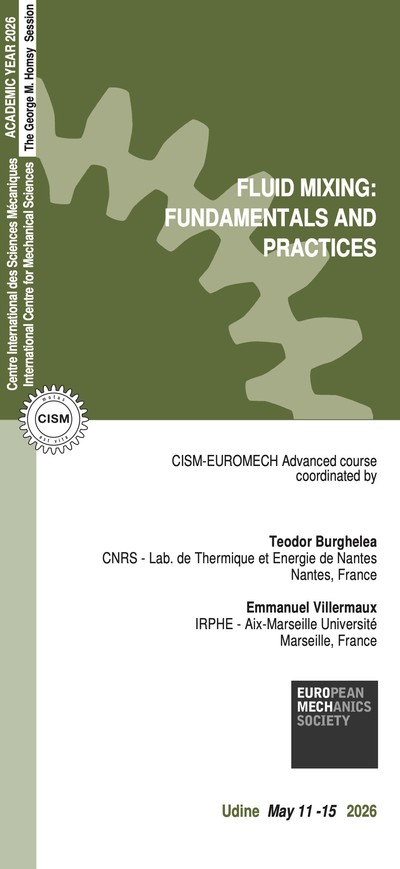Andreotti, B., Forterre, Y., Pouliquen, O., Granular media, Cambridge University Press, 2013.
Balachandar, S., A scaling analysis for point–particle approaches to turbulent multiphase flows. Int J Multiphas Flow, 35(9), 801-810, 2009.
Balachandar, S., Eaton, J.K., Turbulent dispersed multiphase flow, Annual review of fluid mechanics, 2010.
Berzi, D., di Prisco, C.G., Vescovi D., Constitutive relations for steady, dense granular flows, Physical Review E, 2011.
Bougouin, A., Lacaze, L., Granular collapse in a fluid: Different flow regimes for an initially dense-packing. Physical Review Fluids, 3(6), 064305, 2018.
Charru, F., Bouteloup, J., Bonometti, T., Lacaze, L., Sediment transport and bedforms: a numerical study of two-phase viscous shear flow. Meccanica, 51(12), 3055-3065, 2016.
Chauchat J. and M. Médale, A three-dimensional numerical model for dense granular flows based on the rheology, Journal of Computational Physics, Volume 256, 696-712, 2014.
Guazzelli, E., Morris, J.F., A physical introduction to suspension dynamics, Cambridge University Press, 2011.
Guazzelli, E., Pouliquen, O., Rheology of dense granular suspensions, Journal of Fluid Mechanics, 852, P1, 2018.
Ling, Y., Parmar, M., & Balachandar, S., A scaling analysis of added-mass and history forces and their coupling in dispersed multiphase flows. Int J Multiphas Flow, 57, 102-114, 2013.
Maurin, R., J. Chauchat and P. Frey, Dense granular flow rheology in turbulent bedload transport. Journal of Fluid Mechanics, 804, 490–512, 2016.
Mazzuoli, M., Uhlmann, M., Kidanemariam, A.G., Direct numerical simulations of ripples in an oscillatory flow. Journal of Fluid Mechanics, 863, 572-600 (2019).
Mazzuoli, M., Blondeaux, P., Vittori, G., Uhlmann, M., Simeonov, J., Calantoni, J., Interface-resolved direct numerical simulations of sediment transport in a turbulent oscillatory boundary layer. Journal of Fluid Mechanics, (under revision).
Mewis, J., Wagner, N.J., Colloidal suspension rheology, Cambridge University Press, 2011.
Vescovi, D., Marveggio, P., di Prisco, C.G., Saturated granular flows: constitutive modelling under steady simple shear conditions, Géotechnique, 2019.
6 lectures on: From the dynamics at the particle scale towards the continuum approach; rheology of dilute and semi-dilute viscous suspensions; the suspension as a single effective fluid; beyond the single-fluid view: two-phase approach; volume-imposed versus pressure-imposed rheology and application to bedload sediment transport.
5 lectures on: Dispersed turbulent multiphase flows: mechanisms, time and length scales of importance and statistical descriptions; simulation approaches: Euler-Lagrange methods with fully-resolved physics; particle laden flows in geophysical applications: cutting edge approaches and what simulations offer; Eulerian two-phase flow simulations for gravity and turbidity currents.
5 lectures on: Numerical modeling for two-fluid approach; regularization of μ(I) rheology and Granular rheology in bed-load transport; turbulence-particle interactions in sediment transport problems; sheet flow under non-breaking waves: laboratory experiments and Eulerian two-phase flow model; up-scaling of granular processes in larger scale problems (e.g. scour).
5 lectures on: Rheology of two-phase granular mixtures; poly-dispersed granular suspensions; transition from quasi-static to dynamic conditions in semi-dilute and dense granular suspensions; static liquefaction in granular materials.
5 lectures on: DEM method and coarse graining for granular flows; rheology extraction of granular/fluid/mixture phase in dense fluid particle flows; resolved vs meso-scale model applied to sediment transport; ripples and dunes; collapse as a model of debris flow, their implication in applications.
5 lectures on: Introduction to granular suspensions in geophysical flows; sediment transport in turbulent flow: interaction between particles and vortex structures; DNS of sediment transport under non-breaking waves; DNS of marine sand ripples; transport of fine sediments: hints on the rheology of colloidal suspensions.
The registration fee is 600.00 Euro + VAT*, where applicable (bank charges are not included). The registration fee includes a complimentary bag, four fixed menu buffet lunches (on Friday upon request), hot beverages, downloadable lecture notes and wi-fi internet access.
Applicants must apply at least one month before the beginning of the course. Application forms should be sent on-line through the following web site: http://www.cism.it. A message of confirmation will be sent to accepted participants. Applicants requiring assistance with the registration should contact the secretariat at the following email address cism@cism.it.
Applicants may cancel their course registration and receive a full refund by notifying CISM Secretariat in writing (by email to cism@cism.it) no later than two weeks prior to the start of the course.
Cancellation requests received during the two weeks prior to the start of the course will be charged a 50.00 Euro handling fee. Incorrect payments are also subject to a 50.00 Euro handling fee.
A limited number of participants from universities and research centres who are not supported by their own institutions can be offered lodging and/or board, if available, in a reasonably priced hotel or student guest house.
Requests should be sent to CISM Secretariat by April 15, 2020 along with the applicant's curriculum and a letter of recommendation by the head of the department or a supervisor confirming that the institute cannot provide funding. Preference will be given to applicants from countries that sponsor CISM.
Information about travel and accommodation is available on the web site www.cism.it, or can be mailed upon request.
* Italian VAT is 22%.





